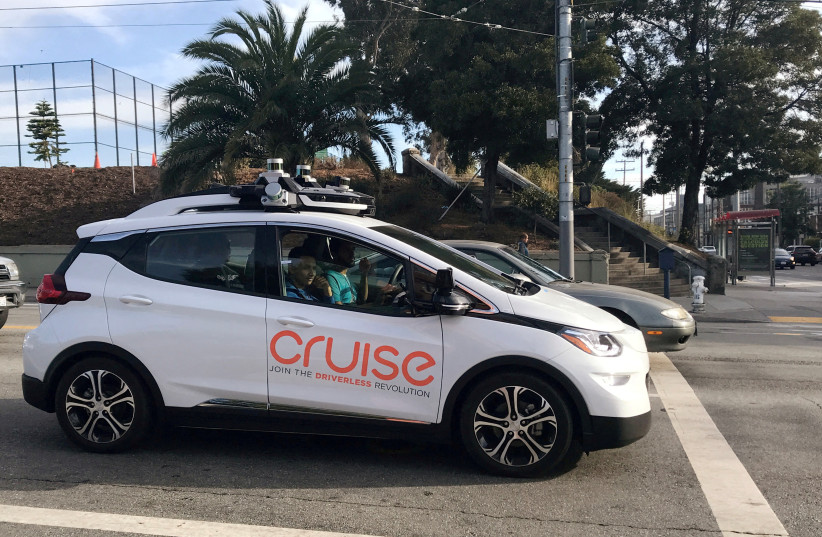Ask a rabbi about self-driving cars and you’d better be ready for a long answer.
Self-driving cars — also known as robotaxis, autonomous vehicles or driverless cars — with their whirring sensors and their odd, almost tentative movements, have become a familiar sight on the streets of San Francisco.
Familiar they might be, but not without controversy. With local incidents of self-driving cars trying to drive into active fire zones, stalling en masse and even crashing into a fire truck this month, reports of autonomous misconduct have been plentiful. Regardless, the California Public Utilities Commission in mid-August expanded commercial robotaxi service to daytime hours in San Francisco for GM’s Cruise and Alphabet’s Waymo autonomous vehicle divisions. City officials are opposed to the expansion, citing safety and other concerns.
And yet the all-electric fleets offer intriguing Shabbat possibilities — not least for observant Jews who traditionally refrain from driving and using electricity on the day. So what do local rabbis say?
“As an Orthodox Jew, in order to evaluate new realities, they are going to try and understand how they work and categorize them within already existing precedent in Jewish law,” said Rabbi Joel Landau of Adath Israel, an Orthodox synagogue in San Francisco.

There is one existing piece of technology that might offer a clue, he said. It’s the Shabbat elevator, which automatically stops and opens its doors at each floor, negating the need to press a button.
Like anything else you ask a rabbi, there is no simple answer
It may seem that an autonomous vehicle, if pre-programmed, could possibly meet the same requirements as a Shabbat elevator. But Landau said it’s not that simple.
“Not everyone is happy with a Shabbat elevator,” he said.
Many elevators make adjustments based on the weight of the passenger, he said, which negates their neutrality, so to speak. By contrast, a running escalator or moving walkway might be OK.
If self-driving cars react to a passenger’s weight or position, that alone might rule them out for Shabbat use among observant Jews. The same is true if riders would need to activate anything to start the ride. Landau said he’s sure the technological know-how to make a Shabbat-compliant autonomous electric car could be developed. He’s just not sure it should be.
The issue of driving on Shabbat was addressed in the Conservative movement back in the 1950s when rabbis allowed driving to synagogue for services as Jews moved into the suburbs and lived too far from shul to walk. Still, the movement does not encourage driving on Shabbat.
“The ideal is that one does not drive on Shabbat and that people live close by to their Jewish communities — to walk to synagogue, share meals, raise families,” Rabbi Amanda Russell of Congregation Beth Sholom, a Conservative synagogue in San Francisco, wrote in an email to J.
But not everyone can reach that ideal, she said. “We know that to be in community on Shabbat, many people have to drive.”
But what about self-driving robotaxis? Would they be better than driving?
“Funny you should ask about this,” Russell said. “These cars have become a small topic of conversation at Beth Sholom, simply because they are taking up precious parking spots in the early morning for daily minyan and on Shabbat!”
Annoyance aside, Russell said the question comes down to the way the cars operate, what they are used for and whether they undermine the spirit of Shabbat. If “pre-arranged and prepaid,” she said, self-driving cars could be “more ideal” on Shabbat than someone driving even an electric car.
So how do self-driving cars really work? Could they really be Shabbat-compliant?
To put it simply, an autonomous car is equipped with an array of sensors and imaging devices, including cameras and LIDAR, which is the spinning device atop the cars that uses light to measure distance. While GPS helps the car map its route, it’s all those sensors that help the car navigate a chaotic street environment.
Right now, riders access the cars through apps on their phones, but pre-arranging a robotaxi pickup is possible.
“To make it permissible, one would want to make the arrangements before Shabbat: pickup and drop-off locations, payment, etc.” Russell said. “That would prevent the passenger from having to use their phone, any ride-share-related technology and any form of money, all of which are prohibited on Shabbat.”
Russell and Landau both said that focusing on keeping the spirit of Shabbat is a crucial guide. Landau said that even if self-driving cars can technically be used — an assumption that hasn’t been truly tested yet — he doesn’t believe that most observant Jews will tap on the Waymo app a few minutes before sundown on Friday.
“Not everything you could do, you should do,” Landau said.
